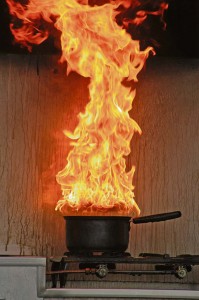As we are nearing the anniversary of one of the largest disasters of the 19th century — the great Chicago fire of Oct. 8, 1871 — we must remind ourselves of the importance of safe fire practices.
Fire safety shouldn’t simply be a one-time affair, but instead a lifetime routine that we practice ourselves and teach to our children. For example, fire and burns are the leading cause of household injuries and deaths in the United States.

Negligent cooking, such as pouring water on a grease fire, is the No. 1 cause of residential fires.
“In fact, it is the third most common source,” according to The Home Safety Council, 2014.
This is such an unfortunate statistic that’s compounded when you take into consideration
how simple it actually is to take preventative measures.
The following are some helpful tips that, when used correctly, will help prevent the spread of fire and lead to a happy and safer tenure while at home in Germany.
To start, negligent cooking is the No. 1 cause of residential fires.
Consider these simple steps:
• Don’t store items on cooking surfaces.
• Never pour water on a grease fire. Instead, close the oven door, or turn off the source of heat and cover the pan with a lid.
• Clean the exhaust hood and duct over the stove regularly, and wipe up spilled grease as soon as the surface of the stove is cool.
• Consider dressing for cooking success. Here’s why: An electrical coil on the stove reaches a temperature of 800 degrees Fahrenheit. A gas flame can reach 1,000 degrees. Your dish towel or pot holder will catch fire at 400 degrees, and so can your bathrobe, apron or loose sleeve shirt. Also, be sure your stove is not located under a window where curtains are hanging.
Second, a space heater can be the most dangerous appliance brought into the home.
Follow these simple steps to eliminate or decrease their likelihood of causing a fire:
• Carefully inspect your space heaters prior to the start of every heating season.
• Keep space heaters at least three feet away from anything that might burn, including the wall.
• Don’t use extension cords with electrical space heaters. Plug them directly into a wall. The high amount of current they require could melt the cord and start a fire.
• Do not store newspapers, rags or other combustible materials near a furnace, hot water heater or space heater, and don’t leave space heaters operating when you’re not in the room.
Third, candles are relatively safe products, but unless they are used safely and watched carefully, they can lead to accidental fires.
According to the National Candle Association, more than 15,000 candle fires are reported
annually. The bulk of fires are due to consumer inattention.
Follow these simple steps:
• Always keep a burning candle within sight.
• Extinguish all candles when leaving a room or before going to sleep.
• Keep candles out of reach of children and pets. Do not place lit candles where they can be knocked over by children, pets or anyone else.
• Place burning candles at least three inches apart from one another. This is to make sure they don’t melt one another or create their own drafts that will cause the candles to burn improperly.
• Be sure the candleholder is placed on a stable, heat-resistant surface. This will also help prevent possible heat damage to counters and table surfaces and prevent glass containers from cracking or breaking.
Lastly, practice exit procedures with your family. Teach children to stay low when escaping a fire, and always check doors with the back of the hand.
Home fire safety is a vital part of protecting members of your household from the devastating effects of a fire. By following these fire prevention tips, you and your family can prevent these situations from turning into serious injury, loss of life and property damage.
Remember to be fire safe, and only you can prevent household fires.
Also, remember to dial 1-1-2 or 06371-47-1-1-2 in the event of an emergency. Should you have any questions or concerns, fire prevention can be reached at 480-5940 or 06371-47-5940.


